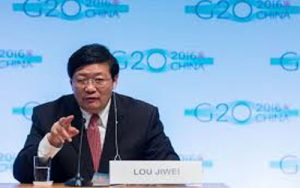
DHAKA, Oct 08, 2016 (BN) – The G20 warned Friday that populist politicians playing up anti-globalization and anti-free trade sentiments were putting the global economy at risk.
The grouping of 20 economic powers suggested that the forces that have put Republican Donald Trump within reach of the US presidency and led to Britain’s vote to leave the European Union could stall already frail global growth.
While not mentioning Trump or other politicians by name, China’s Finance Minister Lou Jiwei, speaking on behalf of the G20, identified such voter-luring populism as one of the largest threats to the economy.
“This trend of deep anti-globalization populism has driven politicians to come up with their campaign slogans and try to win the votes and support. That has brought us uncertainty,” Lou said after a G20 finance ministers meeting.
“We need to recognize some political risks such as the presidential election in some countries and in major economies,” he added during the IMF-World Bank annual meetings in Washington.
– Trump, Brexit in focus –
Lou’s comments came as the US presidential race entered its final weeks with upstart Trump wielding potent anti-immigration, anti-free trade rhetoric in his battle with Democratic rival Hillary Clinton.
But also in the background are the populist currents in Europe behind the Brexit vote and those affecting the coming French and German elections.
In both regions, politicians have made gains touting their opposition to the ambitious transatlantic and transpacific free trade deals, known respectively as TTIP and TPP, potent vote-getters among people worried the deals will cost jobs.
The trend has worried the leaders of the world’s largest development institutions, IMF Managing Director Christine Lagarde and World Bank President Jim Yong Kim.
Lagarde said that with the world economy growing at a “sub-par” 3.1 percent this year, now is not the time to be erecting trade barriers.
“Trade has become a political football,” she said Friday.
Kim urged world governments to banish “the storm clouds of isolationism and protectionism,” saying that open borders had lifted a billion people out of poverty in over a quarter century.
Few of the powerful economic decision makers in Washington would speak openly about Trump, though he was clearly a key worry.
Pierre Moscovici, the EU economic affairs commissioner, took the issue head on, saying that, in the US election, Trump “is not the most reassuring choice from an economic point of view.”
And speaking at a conference on the fringes of the IMF-World Bank meetings,the head of the Institute of International Finance global banking association said the populist rhetoric was impacting markets.
“Policy-makers may be tempted by the siren songs of protectionism and nativism, but a retreat inward would be a break with the principles that have delivered unprecedented progress to literally billions of people throughout the world,” said Tim Adams.
At the same time, all the officials acknowledged that, as politicians like Trump have been arguing, globalization has hurt certain populations and in some cases exacerbated inequality.
“Our research shows that inequality is still far too high, both globally and within countries, constraining growth and breeding instability,” Kim said Thursday.
“We need to focus on growth and continue to reduce inequality — and we have to make growth more equitable, and more sustainable.”
Meanwhile in New York, negotiators on the Transatlantic Trade and Investment Partnership responded to the political attacks on their talks by saying they were determined to push toward a deal, which would establish the world’s largest free trade zone.
“We have heard some skeptical voices about TTIP lately, but I want to emphasize that the United States remains fully engaged in these negotiations and is as committed as ever to their success,” said chief US negotiator for the United States Dan Mullaney.
His European counterpart Ignacio Garcia Bercero added: “The reasons to continue these talks are as strong as three years ago when we started negotiating this biggest bilateral trade agreement in the world.”
(BSS/AFP)




